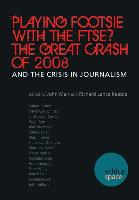Playing footsie with the FTSE? The financial crash of 2008 and the crisis in journalism is a special book issue of Ethical Space to mark a special event. In the autumn of 2008, the world economy nearly went into meltdown after the collapse of Lehman Brothers on 15 September. The banks were on the brink; the cash machines worldwide were about to be shut off. In the end, the global economy was saved - but at a huge long-term cost. Why did so few politicians, economists and academics see the Great Crash coming and why did so few journalists report it in advance? Here the movers and shakers of financial journalism try to give some explanation:
• Robert Peston, of the BBC, then a maverick now proved to be totally right
• Peter Wilby, of the Guardian, who advises us not to trust financial journalists
• Jane Fuller, top financial analyst, ponders the implications for all journalists
• Anne Gregory, Professor of PR, examines the role of public relations in the credit crunch
• Award-winning Martin Lewis critiques the “TV property porn merchants”
Other distinguished contributors include Hugh Pym, of the BBC, Pulitzer Prize-winner David Cay Johnston, INSEAD scholar Matthew Fraser, Francesco Guerrera, of the Financial Times, PR guru Trevor Morris, Alex Brummer, of the Daily Mail, Brian Caplen, editor of the Banker, Howard Davies, LSE Director, Nicholas Jones, for 30 years a BBC correspondent, top media blogger Kristine Lowe and Professors John Tulloch and Damian Tambini.
Edited by John Mair, of Coventry University, and Richard Lance Keeble, of the University of Lincoln, this is a seminal collection of essays on the Great Crash from those at the epicentre of the financial storm.
“Very timely and topical, this is an extremely valuable collection of reflections from leading commentators on how the media covered the Great Crash of 2008”
Professor Daya Thussu, University of Westminster, London




